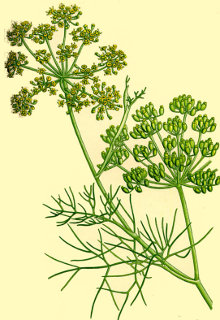 Foeniculum vulgare
Foeniculum vulgareFennel
As testimony to its hotness, Prometheus brought fire to Earth in a fennel stalk. Pliny wrote that snakes used fennel to renew their eyesight (to help shed their skins), so consider this plant for divination or transformation. Fennel stalks were the weapon of choice of the Benandanti, who fought in dreams against ill-intentioned witches over their community's fertility in 16th century Friuli in northeastern Italy. Fennel is one of the ingredients in Woden's Nine Herbs recorded in 11th century England, where this magic herb was hung over the entry on Midsummer Eve to keep away malicious witchcraft and fire. Some curanderos brush the body of a patient suffering susto (shock) with fennel branches as they read psalms over them, so various cultures have valued fennel's ability to protect and purify. We read of an interesting Athenian ritual practiced by women to mark the death of Adonis every year in midsummer; they would plant pots or earth-filled baskets on rooftops with fennel, lettuce, barley, or quick-growing flowers. These were the Gardens of Adonis. While the plants grew, the women would feast and revel on the rooftops amongst the plants, but when the plants died for lack of root space, the pots would be thrown into the river with great mourning. Some historians have interpreted this festival as a fertility ritual; others have said it is a playful comment on the ephemeral nature of sexual relations, symbolizing the crush or honeymoon. It's interesting to me that this festival took place at Midsummer, just as the connection to fennel stalks as protective up north. Lots of curious Fire connections with this herb.
Mundane Uses
For the ancient Romans, fennel was mainly a salad veggie, but the stalks were also
used to weave beehives. Medieval Europeans considered this magic
herb hot in the third degree, so the leaves were often served
with "cold" food, like fish; dill and fish are still a
popular combo.In Early Modern England, fennel seeds flavored
apple pies and breads. Puritans chewed fennel seeds in church, perhaps
to stay awake or to suppress hunger during the long services, yet
they also frowned upon the use of fennel, since it was fiery. The
Hopi Indians smoked fennel leaves as a substitute for tobacco. Because
fennel seeds are an important ingredient in Italian sausage, they can add a sausagey taste to non-meat dishes. This plant attracts
swallowtail butterflies to the garden, and the boldly striped caterpillars
will eat the leaves but not harm the plant. Fennel is also known
as hinijo, fenkel, and finkel. This variety of fennel is good for seeds or herb; it's not the same as bulb fennel.
This particular variety of fennel was developed for its especially
large seeds, twice as large as those of a typical fennel (Grosfruchtiger
= big fruited), although the plant itself is a little smaller.
How to Grow Fennel
Barely cover to germinate at room temperature in 1-2 weeks. It's best to start
them in spring and sow them either directly in the ground after
your last frost or grow as transplants. Transplant to full sun, spacing
2-4"/5-10cm apart; although this variety of fennel gets 2-3ft/60-90cm
tall, it does
not get wide and can use help from comrades to stand up. Some people
claim that fennel will cross with dill or will inhibit the growth
of other herbs; this is not true. Seeds will begin production
about three Moon cycles from germination. This magic herb is perennial
only to zone 7 (0F/-18C), but it will self-seed where it's happy. Its decorative
leaves look great planted behind flowers. In spring you
might see birds harvesting
the tender leaf tips to add aromatic protection to their nests.
General
growing info
Foeniculum vulgare
"Grosfruchtiger"
Fennel
50 seeds $3.25
Get
some fennel essential oil
Get
some fennel
Uses in Witchcraft & Magic:
Protection, esp. from Fire
Protection of Crops
Elemental
Magic
Fire Herb
MercuryHerb
© 2010-2024 Alchemy Works; No reproduction without permission